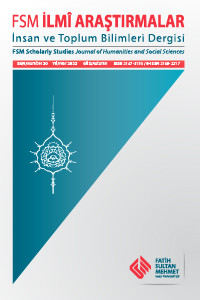İslam Hukuk Metodolojisinde Delil Nazariyesi: Kavramsal Çerçevesi, Temel İlke ve Özellikleri ile Şer’î Delillerin Tasnifi
Öz
Şüphesiz aklî ya da naklî olsun bütün ilimlerde ileri sürülen görüşlerin meşru olması
ve kabul görmesi için, bu görüşlerin kabul edilen ilke ve esaslara uygun olması gerektiği
gibi aynı zamanda akla ve selim fıtrata uygun delillere dayanması gerekmektedir. Gerçek
bir delile dayanmayan görüşler, inandırıcılığını ve meşruiyetini kaybettiği gibi hiçbir değer
de ifade etmez. Bu sebeple hayatın her alanında teklifî-vaz’î hükümler koyan Şâri’
Teâlâ Kitâb-ı Hakîminde, vaz’ ettiği hükümleri makul ve maslahata uygun delillere dayandırmış
ve pek çok yerde hükümlerin illet ve hikmetlerini açıkça ifade etmiştir. Ana
konusu ve temel amacı şüphesiz müçtehidin şer’î-amelî hükümleri istinbat ederken dayanacağı
deliller ile bu delillerden hüküm çıkarmaya yarayan metotlar ve yöntemler olan
fıkıh usûlü ilminin, gerçekte deliller nazariyesinden ibaret olduğunu söylemek mübalağa
olmaz. Zira usûl âlimlerinden çoğu bu ilmi “şer’î deliller ile bu delillerin hal ve keyfiyeti,
bu delillerden hüküm istinbat ederken yararlanılan ilke ve kaideler” şeklinde tanımlayarak
bu hususa dikkatleri çekmişlerdir. Biz bu makalemizde İslam hukuk usulünde delil
nazariyesi başlığı altında, delil kelimesinin kavramsal çerçevesini ortaya koyduktan sonra
bu anlamda kullanılan diğer kavramlarla delil kelimesini karşılaştırarak, bahsi geçen kavramları
lügat ve delalet yönünden inceleyecek, benzer veya farklı yönlerini tespit etmeye
çalışacağız. Bir hükmün istinbâtı yahut bir iddianın vakıaya uygunluğunun tesbiti için ileri sürülen delillerde bulunması gereken özellikleri, belli ilke ve kaideler şeklinde ortaya
koyduktan sonra ifade ettiği bilginin kesin olup olmaması, oluşumunda müctehidin katkısının
bulunup bulunmaması yahut müstakil bir hukuk kaynağı olup olmaması açısından
şer’î delilleri tasnif etmeye çalışacağız.
Anahtar Kelimeler
Delil nazariyesi hüccet burhan usûl fıkıh edille şeriat usûl-i fıkh emâre alâmet
Evidence Theory in Islamic Law Methodology: Classification of Shari’a Evidence through Conceptual Framework, Basic Principles and Characteristics
Öz
There is no doubt that the perceptions offer in all sciences, whether mental (akli) or
transmitted (nakli), are legitimate and In order to be accepted, these views must be under
the principles that are applied in every science method. At the same time, these views
should be based on evidence that is compatible with reason and absolute truth which is
required. Opinions that are not based on real evidence lose their credibility and legitimacy,
and they do not mean anything. For this reason, the judge of the book of Allah ta’ala,
who made fard/wajib and contingent (vazi) provisions in all areas of life, in the judge of
the book, he based the judgments he preached on reasonable and beneficial evidence and
clearly expressed the reasons and wisdom of the judgments in many places. It would not
be an exaggeration to say that the science of fiqh, the main subject and main purpose of
which is undoubtedly the evidence on which the mujtahid will base while deducing the
religious and practical judgments, and the methods and methods used to draw conclusions
from this evidence, is actually the theory of evidence. Because most of the scholars of
methodology have drawn attention to this issue by defining this science as “sharia proofs,
the state, and condition of these proofs, the principles, and rules that benefit from the
inference of judgment from these proofs”. In this article, after revealing the conceptual
framework of the word “evidence” under the title of “evidence theory in Islamic legal
procedure”, we will compare the word “evidence” with other concepts used in this sense
and examine the aforementioned concepts in terms of lexicon and signification and try to
identify their similar or different aspects. We will try to convey the views of procedural
(usul) scholars on the classification of the shar’i evidence according to whether the information
he expresses is certain, whether the mujtahid has contributed to its formation, or
whether there is an independent source of law.
Anahtar Kelimeler
Evidence theory sharia proofs jurisprudence legal evidences proof evidence usul el fıqh
Ayrıntılar
| Birincil Dil | Türkçe |
|---|---|
| Bölüm | Araştırmalar ve İncelemeler |
| Yazarlar | |
| Yayımlanma Tarihi | 28 Aralık 2022 |
| Yayımlandığı Sayı | Yıl 2022 Sayı: 20 |


